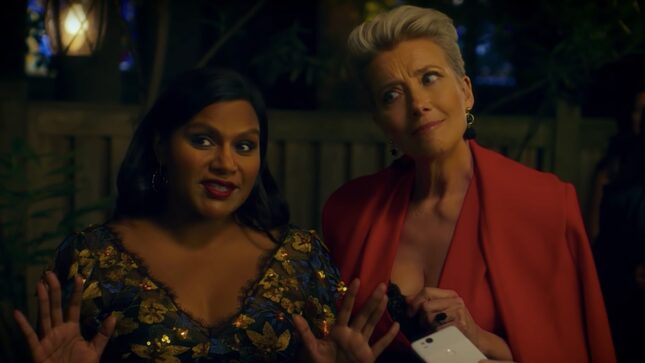
Screenshot: Amazon Studios
There are many dramatic moments in Late Night in which a character takes a stand. A too-demanding job is walked out on, a subordinate is coldly deemed inconsequential, fists are raised in the face of “white oppression.” And yet by the end of the film, it’s hard to know what exactly this movie is trying to say, despite the swooning music cues and tough-talking monologues that proliferate it, if other than that the worst stereotypes about women in comedy are apparently true.
Late Night has the markings of what could be a biting satire on bro-filled writer’s rooms and the unbearable whiteness of late night television. Mindy Kaling, who co-stars in the film, wrote the script inspired by her experiences as the lone woman working in The Office’s writing room. In the movie, she plays Molly, a bubbly aspiring comedian who works at a chemical plant with no work experience in comedy, who dreams of working for Kathryn Newbury (Emma Thompson), a lone woman in the late-night talk show genre and a veteran comedian with a room full of Emmys.
Thompson’s biting performance as Kathryn is easily the best part of the film, resorting to calling the writers in her room simply by numbers since she can’t bother to remember their names, and rolling her eyes at the profiles of her boss that make sure to qualify her as a “female” executive. But she has a serious problem: she’s going to be fired. The show is irrelevant, in part because of Kathryn’s bland, all-white dude, Ivy League-bred writers room, and her unwillingness to stay current with social media and pop culture. She decides she needs to hire a woman, and any one will do. Molly gets the job, not because she’s talented, but because she’s there.
-

-

-

-

-

-

-

-

-

-

-

-

-

-

-

-

-

-

-

-

-

-

-

-

-

-

-

-

-

-

-

-

-

-

-

-

-

-

-

-








































